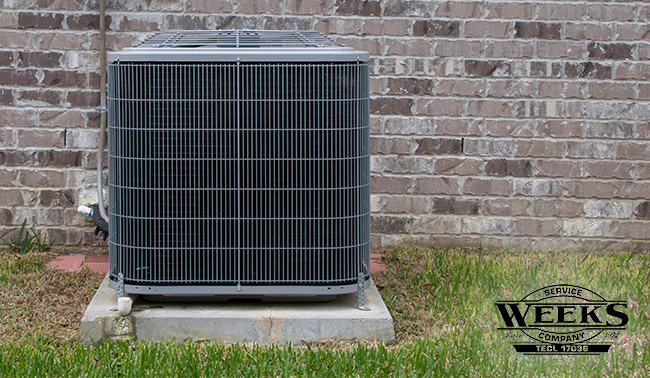The outdoor condenser, or outdoor condensing unit, is a vital part of the heating, ventilation and air conditioning (HVAC) system in your home. You might think of your AC system as a couple of vents blowing cool air into your living room, but it’s a little more complex than that.
Simply put, your air conditioning system works by absorbing warm air from your home and releasing it outside. The outdoor condenser does the latter and without it, the heat in your house would have nowhere to go.
If your outdoor condensing unit begins to malfunction, it’s important to take care of the problem immediately. However, it is sometimes difficult to pinpoint what the problem even is. To lessen your frustration, the experts at Weeks Service Company have prepared a quick guide to provide an answer to the nagging question: What is wrong with my outdoor condenser?
The Role of the Outdoor Condenser
Before you take any action, read a little bit about how the outdoor condenser works and the role it plays in your home’s HVAC system.
There are three components to your entire air conditioning unit. The evaporator, the compressor and the condenser. The evaporator is in the air handling unit which can be found in your basement. The compressor and condenser are usually in the outdoor condensing unit. A liquid called refrigerant loops through these components, frequently changing from liquid to gas.
As warm air from your house moves to the evaporator or evaporator coil, the refrigerant in the coil absorbs the heat from the air and vaporizes. The indoor air, now having had the heat removed from it, is cooler and a fan blows it back out into your home. Meanwhile, the evaporated refrigerant moves into the compressor in the outdoor condensing unit. The compressor pressurizes the vaporized refrigerant, creating a higher temperature and pressure. This forces the gas to move to the condenser. There, the gas condenses into cool liquid and heat is radiated from the process and dissipated with the help of fans.
How to Tell If Your Outdoor Condenser Is Malfunctioning
Now that you have some idea of how your outdoor condenser works, here are some signs that could indicate a problem with it.
Warm Air Through Vents
If warm air is blowing through your vents or there isn’t significant cooling happening, there might be something wrong with your condenser. This could be due to low refrigerant levels or the condenser component malfunctioning.
To check for any problems with refrigerant levels, reach behind your outdoor condenser and feel the refrigerant lines. If they are cold, that means they’re working fine. Check to see if there are any leaks near the condenser. Refrigerant leaks can force your cooling system to work overtime to be even remotely effective.
Make sure to remove any large debris, like leaves and branches, from your unit. Debris can create obstructions in your condenser and bend its coil fins. Bent or clogged coil fins can cause a restriction in air flow, decreasing your AC’s efficiency. Also, remove any dust that has accumulated on the condenser coil. Keeping your outdoor condenser well-maintained can prolong its life and reduce the chances of repairs.
Noisy Fan
If your outdoor condenser is making an unusual noise, that means there could be a problem with its fan. If it is making a hissing or a high-pitched noise, it is likely there has been some damage to the refrigerant lines and there is a refrigerant leak. Shut the air conditioner off and immediately call a professional to take care of this problem as it could be hazardous.
If you hear clanging, check to see if any debris is in the fan. If you hear rattling, there are probably some lose parts and screws in your outdoor unit that need to be tightened up. Ignored, these lose parts can damage other components of your outdoor condenser.
You might want to check your AC capacitor as well, especially if you hear an odd humming. The capacitor is a small cylindrical object that stores energy and sends a jolt to start a motor or continually sends jolts to keep a motor running. To test if a capacitor is working, use a long object like a stick and slide it through the fan grate. Use the stick to give the fan blade a push. If the fan starts off on its own, you probably have a bad capacitor. You can try changing it by yourself but if you have any doubts, call a technician.
High Electricity Bill
Keep an eye on your electricity bill. If it is much higher than usual, try out simple solutions first. Try cleaning out your air filter and making sure your windows are sealed tight. However, if you have tried everything you can, there might be problems in the condenser. Common problems include a faulty capacitor or a worn-out compressor. If your compressor is not putting the right pressure on the refrigerant, it is decreasing the efficiency of your home’s AC.
If you think the air conditioning in your home has any problems, the best solution is to call to a professional for maintenance, repairs and tune-ups. The experts at Weeks Service Company will catch any issues your AC is giving you and provide effective strategies and solutions to make sure there are no costly difficulties in the long run! Give us a call at 281-738-1362 for more information.



